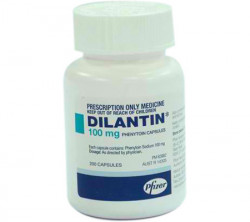Dilantin (phenytoin) Coupons, Discounts & Cost
Dilantin (phenytoin) is a drug with anticonvulsant action. One way to save money on the Dilantin (phenytoin) retail cost regardless of income and insurance status is to use Dilantin (phenytoin) coupons or discount cards from RXCoupons. Use our Dilantin (phenytoin) coupons at your online pharmacy and receive up to 75% off the sale price each time you refill your prescription.
Dilantin (phenytoin) instructions and description
Dilantin (phenytoin) is a drug with anticonvulsant action. It has antispasmodic, anti-arrhythmic and analgesic effect. The drug is used to treat epilepsy (seizures), tonic-clonic seizures (treatment and prevention), ventricular arrhythmias (including those related to intoxication with glycosides or tricyclic antidepressants), trigeminal neuralgia (simultaneously with carbamazepine).
When Dilantin (phenytoin) is contraindicated
Do not use this drug if you have sinus bradycardia, second- and third-degree atrioventricular block, sinoatrial block, Stokes–Adams syndrome, cachexia, heart failure, functional disorders of the kidneys and liver, hypersensitivity to the drug.
Dilantin is contraindicated in pregnancy and during lactation.
How to use Dilantin (phenytoin)
The initial dose for adults is of 3-4 mg/kg. The dosage may be gradually increased (until the optimal therapeutic effect). Children usually use 5 mg/kg per day in 2 doses, but not more than 300 mg per day.
The most common side effects of Dilantin (phenytoin)
Digestive system: liver damage, nausea, constipation, vomiting, toxic hepatitis, hyperplasia (more common in patients under 23 years old). Central and peripheral nervous system: ataxia, nystagmus, mood changes, confusion, muscle weakness, dizziness, hand tremors, nervousness, sleep disorders, peripheral neuropathy. Endocrine system: hypertrichosis. Musculoskeletal system: Dupuytren's contracture; rarely - peripheral polyarthropathy, rickets and osteomalacia (during long-term therapy). Hematopoietic system: rarely - megaloblastic anemia, thrombocytopenia, granulocytopenia, leukopenia, pancytopenia, agranulocytosis. Metabolism: impaired glucose tolerance, hypocalcemia and disorders of vitamin D metabolism. Allergic reactions: skin rash, eosinophilia, fever. Other reactions: rarely - Peyronie's disease.
Special information about Dilantin (phenytoin)
Sudden discontinuation of phenytoin in epileptic patients can lead to additional withdrawal symptoms. Patients should choose other anticonvulsants in case of hypersensitivity or allergic reactions. Phenytoin is metabolized in the liver, so patients with functional hepatic impairment and elderly patients should use lower doses of the drug. During long-term therapy, it is advisable to consume vitamin D rich foods daily.
The concentration of phenytoin may be increased in acute alcohol intoxication (do not drink alcohol during therapy).
Note that phenytoin may slow down the reactions.
Combination of Dilantin (phenytoin) with other substances
Dilantin (phenytoin) may cause unwanted effects when combined with certain drugs.
Dilantin should not be used with drugs that have a depressant effect on the central nervous system. It should be used with caution with certain antifungal agents, clozapine, digitoxin, corticosteroids, estrogens, furosemide, doxycycline, oral contraceptives, quinidine, rifampin, vitamin D.
Amiodarone, antifungal agents (including fluconazole, miconazole, ketoconazole, itraconazole), metronidazole, sulfonamides, chlordiazepoxide, tolbutamide, chloramphenicol, diazepam, halothane, fluoxetine, isoniazid, methylphenidate, omeprazole, sulfinpyrazone, and trazodone may increase the concentration of phenytoin in plasma (high risk of adverse effects).
Acetazolamide may lead to osteomalacia, rickets.
Phenobarbital, phenothiazine derivatives (including chlorpromazine, prochlorperazine, thioridazine), antineoplastic agents may increase or decrease the concentration of phenytoin in plasma.
Valproic acid may reduce the total concentration of phenytoin in plasma (within the first few weeks of therapy).
Acyclovir may reduce the effectiveness of the drug.
Verapamil, nimodipine, felodipine, desipramine, pyridoxine may reduce the concentration of phenytoin.
Imipramine, clarithromycin, ritonavir may increase the concentration of the drug.
Paracetamol, carbamazepine, reserpine, folic acid may reduce the therapeutic effect of phenytoin.
Theophylline and folic acid may reduce the concentration and effectiveness of phenytoin.
Dilantin (phenytoin) Conditions of storage
Store in a dark, dry place, inaccessible to children, at a temperature of 5-30° C.

